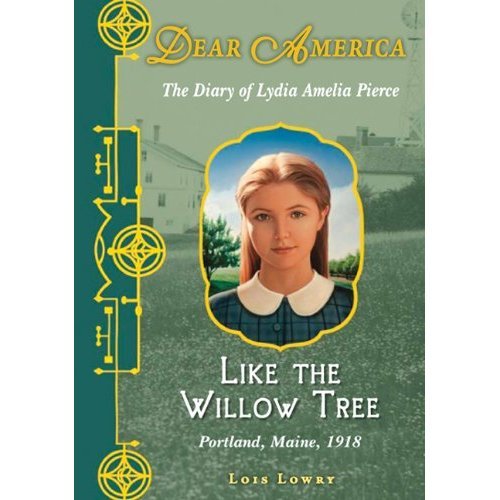From the simple beauty of its barns and buildings to the odor of thin-sliced lemons baking in a two-crust pie, Maine’s Shaker Village at Sabbathday Lake testifies to the faith of dedicated people.
That dedication emerges strong and compelling in Bridgton writer Lois Lowry’s new book, “Like the Willow Tree: The Diary of Lydia Amelia Pierce,” a strong addition to Scholastic’s “Dear America” historical fiction series for readers ages 8 to 14.
First, however, a quick word of caution: Don’t dismiss this small joy of a book simply because you may be older than its designated readers. Written as the diary of a young Portland girl named Lydia Amelia Pierce, it is a delightful book — lively, informative and quick to read. It’s also a story of some very special neighbors.
The time is October 1918, a month before the end of World War I. On the domestic front, Portland has been upended by a deadly epidemic of Spanish influenza that has ravaged much of the country. In Maine’s largest city, schools have been turned into hospitals, and contagion haunts the streets. Early in the story, it strikes Lydia Pierce’s family, killing her parents and the family baby, leaving Lydia and her brother Daniel orphaned and alone.
For those familiar with Chosen Land, the religious name of the Shaker community atop rolling countryside between Gray and Poland Spring, Lowry provides a glowing chest of memories. For all readers, she presents a memoir of a time when children bereft of hope and family were sent to Sabbathday Lake to be raised by the Shakers. The distance from Portland in geographical terms was 27 miles, but the change in lifestyles was culturally vast.
The Shakers, descended through England from a French radical religious group, were celibate men and women who dedicated their hands to work and their hearts to God. Following the teachings of Mother Ann Lee, who came from England to the United States with eight followers in the late 1700s, they committed themselves to simplicity, equality of the sexes and hard work. All to a sacred purpose. They were perfectionists, looking to do every task as a testament of their faith. Raising orphaned children was one of those tasks.
Travel to Shaker Village, now a National Historic Site, almost a century after Lydia’s story is set, and you can feel the history yourself. There, in the community’s graveyard, stands a single gray headstone with the word: “SHAKERS.” It proclaims the faith of those buried there, men and women equal in death as they were in life.
Looking out on them are three surviving Shakers, their village still a testament to faith and hard work. They are all that remain of nearly 5,000 Shakers said to have been active in this country in 1840.
For orphaned Lydia Pierce, however, back in 1918, the Sabbathday Shakers were, quite literally, a godsend. Their welcome was warm but their values and customs were new. Like so many real-life children of her time, she had to learn as she went along.
Lydia, we discover, learns quickly. “I was accustomed to prayers at my church back home,” she tells her diary. ” ‘Our Father who art in heaven’ — I’ve said that as long as I can remember. But the Shakers pray not to Our Father, but to Father-Mother God. It is always that — Father-Mother — never Father alone. They believe in a God that is male and female both! Isn’t that odd?”
There is considerable joy to be found at Chosen Land too, in doing the work of the world well. Knitting a simple washcloth becomes a victory for Lydia over her own impatience. Admiration for the gifts of others also transcends envy. “Brother Delmer,” she recounts, “has a gift for mechanical things. He built his own bench saw when he was 18 and the steam-fitted greenhouse only two years later.”
” ‘Tis a gift to be simple, ’tis a gift to be free,” Lydia reminds us, citing the words of a familiar Shaker song. The unfolding story of her girlhood in “Like the Willow Tree” testifies to its truth.
Nancy Grape writes book reviews for the Maine Sunday Telegram.
Send questions/comments to the editors.



Success. Please wait for the page to reload. If the page does not reload within 5 seconds, please refresh the page.
Enter your email and password to access comments.
Hi, to comment on stories you must . This profile is in addition to your subscription and website login.
Already have a commenting profile? .
Invalid username/password.
Please check your email to confirm and complete your registration.
Only subscribers are eligible to post comments. Please subscribe or login first for digital access. Here’s why.
Use the form below to reset your password. When you've submitted your account email, we will send an email with a reset code.